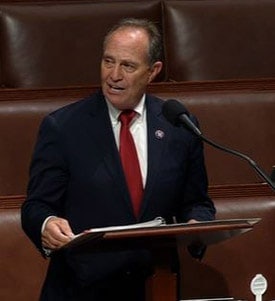
Editor’s note: This article was originally published Jan. 31 and has been updated to reflect the House’s passage of the SAFE Banking Act as an amendment to the America COMPETES Act.
In one of his final stints on Capitol Hill, Rep. Ed Perlmutter isn’t ready to call it quits on banking reform for the cannabis industry.

The Colorado Democrat, who assumed office in 2007, announced in early January that he won’t seek reelection come November, attracting the attention of those throughout the cannabis industry, many of whom have backed his fight to provide clarity and safe harbor to financial institutions servicing cannabis clients.
Perlmutter, 68, is the chief author of the Secure and Fair Enforcement (SAFE) Banking Act, which passed the U.S. House five times between 2019 and 2021, including twice as a standalone bill, and as an amendment to the National Defense Authorization Act in September 2021, before it was later removed from the military spending package during negotiations between the House and Senate.
RELATED: U.S. House Adds SAFE Banking to Defense Spending Package
All five times SAFE Banking passed the House prior to 2022, it stalled before making headway in the Senate. But behind broad bipartisan support in his chamber, including a 321-101 roll call vote in April 2021, Perlmutter isn’t giving up on its complete passage.
In his most recent move, Perlmutter announced Jan. 28 his intention to attach SAFE Banking as an amendment to the America COMPETES (Creating Opportunities to Meaningfully Promote Excellence in Technology) Act of 2022. The legislation, House Bill 4521, is also known as the Bioeconomy Research and Development Act of 2021.
A 2,900-plus-page bill, the COMPETES Act focuses, in part, on increasing competitiveness with China and supporting the U.S. chip industry, including $52 billion to subsidize research for semiconductor manufacturing and research, Reuters recently reported.
On Feb. 3, House members officially approved SAFE Banking a sixth time via an en bloc amendment package to the America COMPETES Act, before the body passed the large-scale bill in its entirety by way of a 222-210 vote on Feb. 4.
“The SAFE Banking Act is the best opportunity to enact some type of federal cannabis reform this year and will serve as the first of many steps to help ensure cannabis businesses are treated the same as any other legal, legitimate business,” Perlmutter said in a release.
He added, “I will continue to pursue every possible avenue to get SAFE Banking over the finish line and signed into law.”
Perlmutter’s main obstacles in the upper chamber have been majority leadership. Former Senate Majority Leader Mitch McConnell, R-Ky., did not act on calendaring the 2019 standalone version of SAFE Banking for debate, while current Majority Leader Chuck Schumer, D-N.Y., has shown a lack of interest in incremental reform efforts before taking up a broader bill, the Cannabis Administration and Opportunity Act, which he sponsors with fellow Democratic Sens. Ron Wyden, Ore., and Cory Booker, N.J.
But as those who operate all-cash businesses in the cannabis space continue to be targets of armed robberies and other violent crimes, Perlmutter said he will continue his pursuit of SAFE Banking until his term expires on Jan. 3, 2023.
“Cannabis-related businesses—big and small—and their employees are in desperate need of access to the banking system and access to capital in order to operate in an efficient, safe manner and compete in the growing global cannabis marketplace,” he said.

























